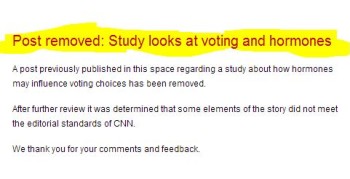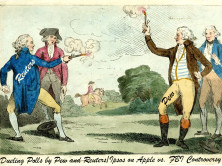
(Credit: CNN, highlight added)
CNN unpublished an article that “did not meet the editorial standards of CNN,” Mediaite reported. The story has been replaced with a post disclosing the unpublishing that reads:
“Post removed: Study looks at voting and hormones
“A post previously published in this space regarding a study about how hormones may influence voting choices has been removed.
“After further review it was determined that some elements of the story did not meet the editorial standards of CNN.
“We thank you for your comments and feedback.”
Mediaite and the Washington Post explained that the post, “Do Hormones Drive Women’s Votes?” was up for “a few hours” and reported on “new research” by Dr. Kristina Durante relating hormones to voting. According to an excerpt of the article posted by Mediaite, the report said in part:
“The researchers found that during the fertile time of the month, when levels of the hormone estrogen are high, single women appeared more likely to vote for Obama and committed women appeared more likely to vote for Romney, by a margin of at least 20%, Durante said. This seems to be the driver behind the researchers’ overall observation that single women were inclined toward Obama and committed women leaned toward Romney.
“Here’s how Durante explains this: When women are ovulating, they ‘feel sexier,’ and therefore lean more toward liberal attitudes on abortion and marriage equality. Married women have the same hormones firing, but tend to take the opposite viewpoint on these issues, she says.”
The Daily Kos re-published the CNN article here, Poynter wrote.
The Atlantic Wire noted that the research cited was “an unpublished scientific study.” Mediaite added that CNN’s Elizabeth Landau tweeted about the controversial post that her story “included skepticism” and was “reporting on a study” that she “did not conduct.” Some of that “skepticism,” the Daily Caller explained, included
“Please continue reading with caution. Although the study will be published in the peer-reviewed journal Psychological Science, several political scientists who read the study have expressed skepticism about its conclusions.”
Poynter reported that CNN’s Matt Dornic said Landau’s story “did not channel through the standard internal process and it was not reviewed by senior editorial staff before appearing on CNN.com.” The Washington Post’s Erik Wemple added that an unnamed “CNN source” said the article was “in poor taste” and indicated the report wasn’t checked normally.
iMediaEthics wrote to CNN’s Dornic asking for confirmation on how long the story was up, what editing it went through before publication, what led to the decision to unpublish, and how the story originated. Dornic responded with CNN’s previously published statement in place of the post and added, as he told Poynter, that:
“However, it’s worth noting that the post in question did not channel through the standard internal process and it was not reviewed by senior editorial staff before appearing on CNN.com. As recognized by our leadership, audience and critics, the piece did not meet the journalistic standards of CNN and should not have appeared on our site. We had an obligation to remove it.”
Durante told iMediaEthics by email that “CNN was given an exclusive on the story and received a press release and the attached paper. The press release is now being held.” See the paper, “The Fluctuating Female Vote: Politics, Religion, and the Ovulatory Cycle.” She also gave iMediaEthics a statement in response to reactions to her research. That statement reads:
“While many factors influence a woman’s political preferences, the research on the relationship between hormones and decision-making is both relevant and timely. I recognize that the findings may prove uncomfortable for some, but they are based on sound science, have been reviewed by academic peers and have been selected for publication in the nation’s highest ranked psychology journal, Psychological Science. I appreciate the public discussion that has taken place on this topic and encourage anyone interested in better understanding the subject matter to read the study in its entirety at the link below.”
iMediaEthics has written to Psychological Science for comment and will update with any response.






